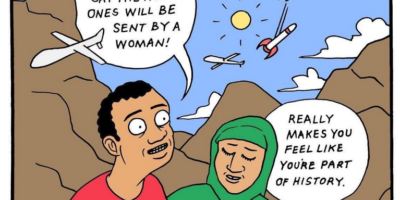By Cameron Lindsey
Quentin Tarantino’s Django Unchained has created quite the storm. People have complained about the movie’s mindless violence, its overuse of certain racial epithets, and its general comic handling of the institution of slavery. Readers, I would like to tell you that Django has all of this and more. However, unlike those critics, I would like to claim that Tarantino’s latest movie is just what American viewers need to see right now.
Before getting into all that, though, first a cheat sheet for all you readers who want to feel involved with the race, violence, and slavery conversations circulating around the film but who do not actually want to watch the movie. Remember these four randomly generated conversational nuggets for when everyone starts talking about it at that next party or get-together:
- The “D” in Django is silent.
- That racial epithet that everyone is talking about is said, by my count, 110 times.
- Christoph Waltz won Best Supporting Actor and Tarantino won Best Screenplay at the Golden Globes.
- The movie is nominated for five Academy Awards including Best Picture.
That’s should be enough to get you by. For the rest of you, please keep reading.
The movie follows a freed slave, Django (Jamie Foxx), and a bounty hunter, Dr. Schulz (Christoph Waltz), as they travel across the antebellum South killing criminals and working to rescue Dajngo’s enslaved wife, Broomhilda (Kerry Washington), from the Mandingo-fighting, plantation owner, and all around bad guy, Monsieur Candie. Along the way, Django and Schulz shoot up, beat up, and dress up in order to get the money they need to purchase Django’s wife on the sly from Candie without the racist owner or his dutiful head-servant, Stephen (Samuel L. Jackson), finding out their true motives. In true Tarantino fashion, expect lots of violence, music that while not obviously fitting, seems as if no other song could have been paired with the images, and a cinematic eye that clearly knows the ins and outs of the spaghetti western genre. Tarantino’s narrative is smart and entertaining and will have action fans cheering, comedy fans roaring with laughter, and fans of good movies applauding the director for another job well done.
Tarantino also does an amazing job of capturing the beauty of the American South. It’s similar to the way that the Coen Brothers recently captured the American West in No Country. I remember specifically watching a glorious shot of a snow-covered plain and thinking to myself, “Where can one person find so many elk?” And while elk population questions might not be on every moviegoer’s mind while they watch, there can be little argument that Tarantino knows exactly the kinds of grand images he needs to capture for his audiences to be astounded.
Regarding the acting, Christoph Waltz will likely win another Best Supporting Actor win with Tarantino at the Oscars this year (Waltz won the same award in 2009 for his role in Tarantino’s Inglorious Basterds). Waltz finds the perfect balance in his role as the sly bounty hunter between a comedic character with no moral guide and a sympathetic character destined to help Django reunite with his captured lover. Jamie Foxx, however, takes no time letting the audience know the kind of character they can expect out of Django. Following the Western style, Django speaks little, scowls a lot, and shoots more, but amidst all of that Foxx’s intensity and desire to see his wife again never fade with the audience.
Finally, Leonardo DiCaprio does all the right things to make you just want to punch him in the face. Not only did Tarantino write a despicable character, but so too does DiCaprio adds an egotistical lightness to the immense evil that surrounds his character. His ability to maneuver between cordial and obsessively violent during the first slave fighting scenes (not for those of weak constitutions), while dramatically impressive, will have your teeth grinding in frustration and disgust for the character.
The movie is not for everyone. If you spit instead of laugh when Django says, “Kill white folks and they pay you for it? What’s not to like?,” then you should not see this movie. When I hear complaints about the movie’s violence, I cannot help but shake my head. This Valentine’s Day, audiences will flock to another movie, A Good Day to Die Hard, to watch Bruce Willis as an all-American white guy shoot up the next nationality to be pegged as a threat to our freedom. The remake of Red Dawn is grossing tens of millions of dollars domestically so that audiences can watch Americans shoot up North Koreans instead of Soviets. And, historically, let’s not forget that little franchise called Rambo. Need I say more?
Ultimately, you can complain all you want about the violence, but is it really because people are shooting at each other, or is it because a black man is shooting at white men? Go ahead and wag your finger at the number of times the “N-word” is said, but can you honestly say that Americans use it any less than they did over a hundred years ago? Tarantino has made a movie where we get to watch Jamie Foxx shoot up the institution of slavery and smile as it burns. You all complain all you want. I am going to go see it again.



Leave a Reply